RoboCop Blu-ray Movie
HomeRoboCop Blu-ray Movie 
Blu-ray + DVD + UV Digital CopyMetro-Goldwyn-Mayer | 2014 | 117 min | Rated PG-13 | Jun 03, 2014

Movie rating
6.2 | / 10 |
Blu-ray rating
| Users | 3.5 | |
| Reviewer | 4.0 | |
| Overall | 3.8 |
Overview
RoboCop (2014)
A grievously wounded cop becomes the test subject for an experimental program designed to help Omnicorp sell America on the idea of using robots to replace the police force.
Starring: Joel Kinnaman, Abbie Cornish, Samuel L. Jackson, Gary Oldman, Jackie Earle HaleyDirector: José Padilha
| Action | 100% |
| Sci-Fi | 63% |
| Thriller | 33% |
| Crime | 6% |
Specifications
Video
Video codec: MPEG-4 AVC
Video resolution: 1080p
Aspect ratio: 2.40:1
Original aspect ratio: 2.39:1
Audio
English: DTS-HD Master Audio 5.1 (48kHz, 24-bit)
French: Dolby Digital 5.1 (448 kbps)
Spanish: Dolby Digital 5.1 (448 kbps)
Spanish: DTS 5.1
Italian: DTS 5.1
Portuguese: Dolby Digital 5.1
Hindi: Dolby Digital 5.1
Urdu: Dolby Digital 5.1
Thai: Dolby Digital 5.1
Spanish DTS=Castillian; DD=Latin
Subtitles
English SDH, French, Portuguese, Spanish, Cantonese, Indonesian, Korean, Malay, Mandarin (Traditional), Thai, Vietnamese
Discs
50GB Blu-ray Disc
Two-disc set (1 BD, 1 DVD)
UV digital copy
DVD copy
Packaging
Slipcover in original pressing
Playback
Region free
Review
Rating summary
| Movie | 3.5 | |
| Video | 5.0 | |
| Audio | 4.5 | |
| Extras | 2.5 | |
| Overall | 4.0 |
RoboCop Blu-ray Movie Review
We Can Rebuild It; We Have the Technology
Reviewed by Michael Reuben May 30, 2014A collective groan greeted the announcement that MGM was remaking RoboCop, followed by howls of protest at the news that the remake would be rated PG-13. Director Paul Verhoeven's 1987 original famously pushed the limits on gore and goo, even before restoration of the trims required to obtain an R rating. (Current audiences usually see Verhoeven's bloodier director's cut, which is the version most commonly available on video.) How could one possibly do RoboCop without a copious amount of spatter? (Let's not debate whether Irvin Kershner had already done so in RoboCop 2.) During production, reports were leaked of running battles between studio executives and Brazilian director José Padilha (Elite Squad: The Enemy Within), making his debut English-language feature, with the director pushing for the tougher rating and the studio insisting on a PG-13 to maximize box office, especially given the film's burgeoning cost. Padilha may have lost the ratings battle, but he won the war of ideas. A devoted fan of Verhoeven's RoboCop, it was Padilha who first suggested the remake to MGM when they were pitching him other projects. Working with up-and-coming screenwriter Joshua Zetumer (whose script was reportedly doctored by several uncredited hands), Padilha followed the path blazed by RoboCop's original writers, Edward Neumaier and Michael Miner, who used the story of an involuntary cyborg to comment obliquely on issues of their time. Though Padilha's film borrows key story points, and his film is studded with affectionate references to the 1987 original, several critical differences radically transform the story. I discuss some of them after the first screenshot; so readers who haven't seen the new RoboCop and want to experience it without any knowledge of its plot should skip that section entirely.
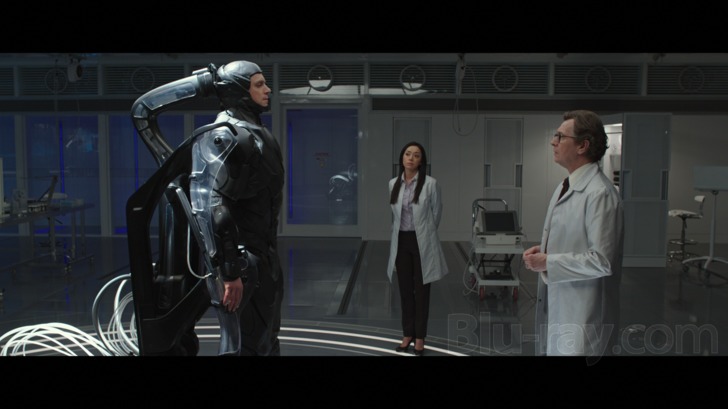
Verhoeven's RoboCop arose from an era in which America was preoccupied with a seemingly unstoppable tide of urban crime. It was also the era of Wall Street and Gordon Gekko, when corporate takeovers, spinoffs and consolidations were transforming the service and employment landscape so rapidly that Verhoeven's depiction of police privatization by OmniConsumer Products (or " OCP") had a timely satiric sting. As the solution to a threatened police strike, OCP proposed robotic automation, and the RoboCop program was a last-minute stopgap when the original robot "cop", the ED-209, malfunctioned. Only after OCP perfected what it called "urban pacification" by automating the police department did it plan to market these products to the military. In the new film, however, priorities are reversed, as foreign policy drives domestic priorities. Omnicorp, which turns out to be a subsidiary of OCP, supplies robots to the military. The ED-209 functions perfectly, and, together with the smaller, lighter EM-208, a human-shaped robot, it has entirely replaced Army assault troops. Padilha's RoboCop opens with a news crew covering these automated forces keeping the peace on the streets of Tehran, assisted by a fleet of airborne drones. When a group of "insurgents" attacks the robots, they are quickly blown to smithereens. The head of Omnicorp, Raymond Sellars (Michael Keaton), is frustrated, because he cannot sell his products for domestic law enforcement, which is the biggest potential market in the world. Robots are barred from that arena by the federal Dreyfus Act, named after its sponsor Senator Hubert Dreyfus (Zach Grenier). Sellars and his advisers, general counsel Liz Kline (Jennifer Ehle) and marketing chief Tom Pope (Jay Baruchel), have twisted and finagled every possible angle to evade the Dreyfus Act, without success. Then Sellars has a brainstorm: Let's put a man inside a machine. It's good PR, and it's a loophole in the law. Thus, instead of being an orphan project suddenly elevated to top priority in a corporate power grab, as in Verhoeven's film, the new RoboCop is an integral element of Omnicorp's marketing strategy from its inception. The science becomes the responsibility of Dr. Dennett Norton (Gary Oldman), who has been quietly researching methods to restore amputees' lost functions with artificial limbs that respond to neural commands. Sellars asks Norton to take his project to the extreme by creating a full-fledged cyborg. After a long screening process, they choose Detroit police detective Alex Murphy as their subject (Joel Kinnaman, The Killing). Like the Alex Murphy so memorably played by Peter Weller, Kinnaman's Murphy has a wife, Clara (Abbie Cornish), and a son, David (John Paul Ruttan). He also has a loyal partner named Lewis, only this time around the partner is a man (Michael K. Williams, The Wire). Once again, Murphy is the victim of a powerful gangster—here named Antoine Vallon (Patrick Garrow)—with major influence and heavy weaponry, but the events have nothing to do with Omnicorp. It's pure coincidence that Murphy is grievously injured at just the moment when Sellars and Dr. Norton are looking for a RoboCop test subject. And unlike Weller's Murphy, Kinnaman's doesn't die or lose his memory. He remains very much alive and himself, as his tearful wife signs the consent forms for Dr. Norton to do whatever it takes to save him. Clara remains a part of the story, first stoically, then desperately determined to bring her husband home to his family. The expanded role of the Murphy family in Padilha's film underlines perhaps its most significant innovation. In Verhoeven's RoboCop, the title character solved his own murder but never regained his memory; his triumph at the end was to recover a semblance of humanity by adopting his former name. But Kinnaman's RoboCop never stops being Alex Murphy. From the moment he wakes up in the elaborate motorized prosthesis that is now his body, Murphy struggles to come to terms with his drastically changed circumstances. That struggle proves to be inconvenient for Omnicorp, because it interferes with the purpose for which RoboCop was created. His human face makes him presentable to the public, but it also makes him less predictable. As immediately spotted by the company's robot wrangler, Rick Mattox (the excellent Jackie Early Haley), the cyborg's organic component—in other words, the human element—is a step backward for the company's highly efficient product line. Mattox refuses to call Murphy "RoboCop"; he prefers "Tin Man". Verhoeven's film turned on a corporate battle between the ruthless OCP executive Dick Jones, who wanted RoboCop destroyed so that Jones's own product line could take his place, and upstart VP Bob Morton, who had snuck the RoboCop program past Jones. In Padilha's film, by contrast, the battle becomes one between Omnicorp and RoboCop himself, as the company discovers that putting a man inside a machine makes the machine uncontrollable. Ironically, Dr. Norton finds himself deceiving and "dumbing down" the man inside, through neurological programming and biochemical manipulation, until the Alex Murphy who first woke up with a prosthetic body has been almost entirely erased. His wife, Clara, no longer sees her husband when she looks in his eyes. He appears, moves and sounds very much like Peter Weller's RoboCop: a soulless cyborg who only mimics humanity. But he still looks human enough to sway public opinion and get the Dreyfus Act repealed—at which point Omnicorp no longer needs him, and Sellars decides to end the program. As in the 1987 film, TV broadcasts provide a running commentary, but television has changed in the intervening decades. Instead of the jokey local news broadcasts with their satirical commercials, we get a tendentious cable news show, The Novak Element, hosted by an immaculately coiffed advocate of robotics, Pat Novak. In an ingenious casting choice, Novak is played by Samuel L. Jackson, who gives Novak much the same intimidating tone he used for his Bible-quoting Jules in Pulp Fiction. Novak may be better dressed than Jules and use flashy graphics instead of a pistol, but he's still a hired gun whose job is to advance the interests of Omnicorp. Novak's segments reflects today's diversified media world, where channels can thrive on a segmented audience of like-minded viewers and hectoring know-it-alls can be found at all points along the political spectrum. Novak is a terrific orator, but pay attention to what he actually says, and it makes no sense. When he celebrates the incorruptibility of robots because, unlike cops, they can't be bribed or bought, it's all true—and it's also irrelevant. What about the people who own and direct the robots? What about Novak himself?
RoboCop Blu-ray Movie, Video Quality 
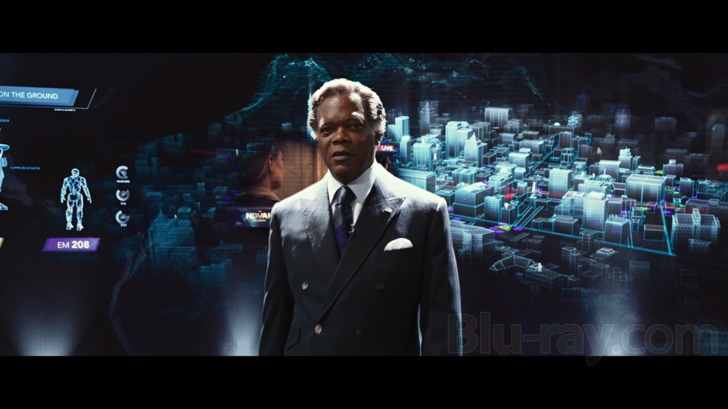
According to the best information I could find, RoboCop was shot with a combination of Red Epic and Arri Alexa digital cameras. The cinematographer was Pedilha's frequent collaborator, Lula Carvalho. Integrated with an array of digital effects, the final image was color-corrected on a digital intermediate, from which Fox/MGM's 1080p, AVC-encoded Blu-ray was presumably sourced. The image is pristine, crisp, detailed and generally spectacular. RoboCop's black suit is both solid black and, where appropriate, shinily reflective. The bright colors of some of the more festive scenes (e.g., the formal introduction of RoboCop to the public at police headquarters) are deep and saturated, while darker, dingier scenes like the training exercise overseen by Rick Mattox are appropriately dull and muted, but with good shadow detail. A scene set outside Dr. Norton's facility in China and the opening sequence in Tehran provide variations in the color palette, and all the lab sequences gleam with the brightness of panels and instruments. The city of Detroit itself (really, Toronto and Hamilton, Ontario) looks shiny and modern. (In a deleted scene, Omnicorp CEO Sellars indicates that the company "cleaned up" the city.) Video noise, aliasing and other artifacts are wholly absent. The average bitrate of 26.29 Mbps is not the highest we've seen for an action-packed film of this nature, but it's certainly adequate, especially given the film's digital origination.
RoboCop Blu-ray Movie, Audio Quality 
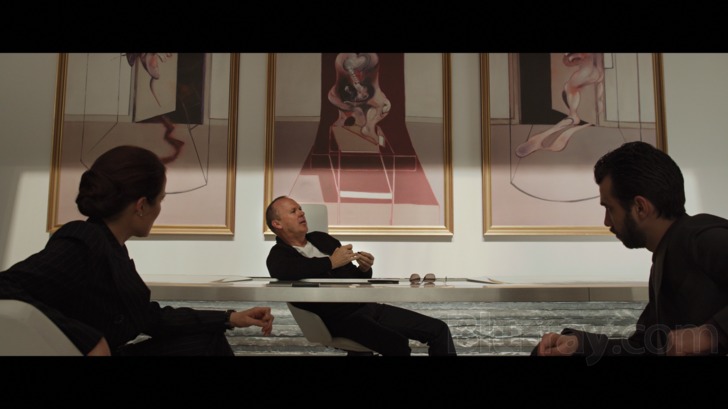
RoboCop's 5.1 sound mix, presented on Blu-ray in lossless DTS-HD MA, is a thunderously satisfying affair with plenty of gunfire and several major battle scenes to rattle unsecured items off the shelves of any viewer with a powerful sound system. When the new sheriff in town first takes to the streets, director Padilha doesn't waste time with petty crime; his RoboCop attacks a drug lab single-handedly, where machine gun fire and hand grenades are all in a day's work. A massive shootout with kingpin Antoine Vallon and his gang involves heavy artillery and rapid fire. In a game of one-upsmanship with the first film, this RoboCop fights not just one ED-209 unit, but several, all of which fire their cannons repeatedly. Gears turn, metal screeches and chunks of metal crash to the ground. Still, some of the most impressive sonic moments in RoboCop are subtler. In the first Novak Element broadcast, the film gracefully transitions from the viewing screen in Novak's studio to the streets of Tehran where the reporters are on the ground; as they step into the street, the humming and clanking of the robot army fills the surround array and immediately puts the viewer into the scene. When Mattox arranges a "grudge match" test for RoboCop against dozens of EM-208 units, the camera races through the giant warehouse in which the robots are taking their positions to attack, and the sound of each one cocking its weapons zips through the surrounds. The whispers, whirs and hums of the mechanisms in Dr. Norton's labs are eerie in their soft efficiency. RoboCop's sound mix is often most effective at its quietest. Dialogue is always clear, and the score by Pedro Bromfman (another regular member of Padilha's team) is appropriately energetic. A brief quotation from Basil Poledouris' score for the 1987 film can be heard during the opening credits.
RoboCop Blu-ray Movie, Special Features and Extras 
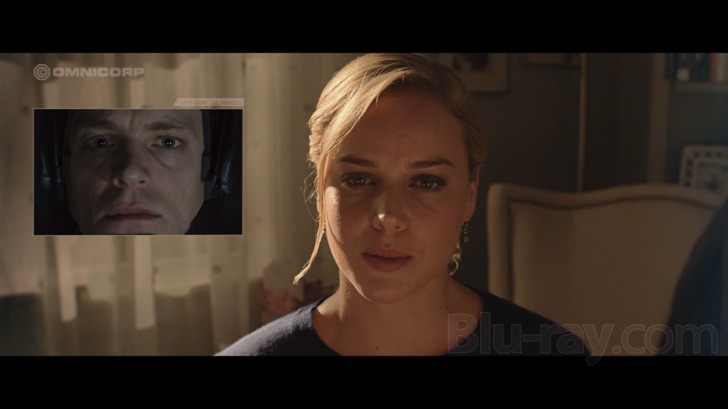
- Deleted Scenes (1080p; 2.40:1; 3:59): A "play all" function is included.
- Pentagon
- Right Hand
- Helicopter
- Lewis and Dean
- Norton Confesses to Dreyfus
- Omnicorp Product Announcement (1080p; 1.78:1; 3:27): A "play all" function is included.
- Exo-Skeleton
- EM-208
- ED-209
- XT-908
- Cruiser 1
- TSR-66
- M2 Battle Rifle
- RC-2000 V1
- RC-2000 V3
- Next Generation RoboCop
- RoboCop: Engineered for the 21st Century (1080p; 1.78:1): A "play all" function is included.
- The Illusion of Free Will: A New Vision (7:46): This featurette focuses on differences between Padilha's RoboCop and Verhoeven's.
- To Serve and Protect: RoboCop's New Weapons (6:05): As the title suggests, this featurette takes a closer look at the specific weapons used by this RoboCop and also at the weapons training that prepared actor Joel Kinnaman for the role.
- The RoboCop Suit: Form and Function (14:54): This featurette examines the design of the new suit and the demands of wearing it. A highlight is Michael Keaton's comparison to the rigors of wearing his suit for Tim Burton's Batman.
- Theatrical Trailer 1 (1080p; 2.40:1; 2:12): Emphasizes the theme of man vs. machine.
- Theatrical Trailer 2 (1080p; 2.40:1; 2:12): Introduces the theme of commercial exploitation.
- Sneak Peak (1080p; various; 8:34): A "play all" function is included. The items marked with an asterisk also play at startup, where they can be skipped with the chapter forward button.
- *MGM 90th Anniversary
- *RoboCop: The Official Game
- *X-Men: Days of Future Past
- *3 Days to Kill
- Sons of Anarchy: Season 6
- Homeland: Season 2
RoboCop Blu-ray Movie, Overall Score and Recommendation 
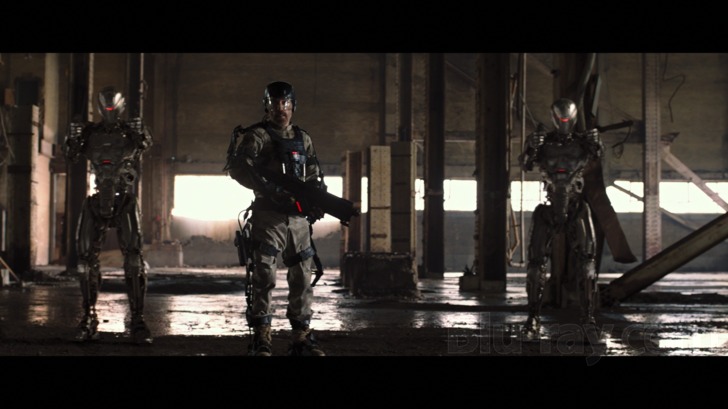
Paul Verhoeven's 1987 RoboCop remains an unsurpassable classic, partly because it came first and partly because Verhoeven's cheerfully offensive visuals have a unique panache that no one else could hope to equal. But Padilha's 2014 version offers its own pleasures, if one approaches it with an open mind and doesn't expect it to replicate the Verhoeven experience. If the original is what you want, it's readily available. This is a different movie, and the Blu-ray presentation is excellent. Highly recommended.
Other editions
RoboCop: Other Editions

RoboCop
2014

RoboCop
FuturePak
2014

RoboCop
2014

RoboCop
Includes Digital Comic Book
2014

RoboCop 4K
Collector's Edition
2014
Similar titles
Similar titles you might also like

RoboCop
Remastered | Director's Cut
1987

RoboCop 2 4K
Collector's Edition
1990

The Equalizer 2
2018

RoboCop 3
Collector's Edition
1993

Batman Begins
2005

The Equalizer
2014

Sicario: Day of the Soldado
2018

London Has Fallen
2016

V for Vendetta 4K
2005

Bullet to the Head
Combo Pack
2012

Lucy
2014

Upgrade
2018

Transformers: Dark of the Moon 3D
Limited Edition
2011

G.I. Joe: Retaliation 4K
+ Extended on BD
2013

Transformers: Revenge of the Fallen 4K
2009

Transformers 4K
2007

Taken 3
Unrated
2015

Elysium 4K
2013

G.I. Joe: The Rise of Cobra
2009

X-Men Origins: Wolverine
Ultimate 2-Disc Edition
2009